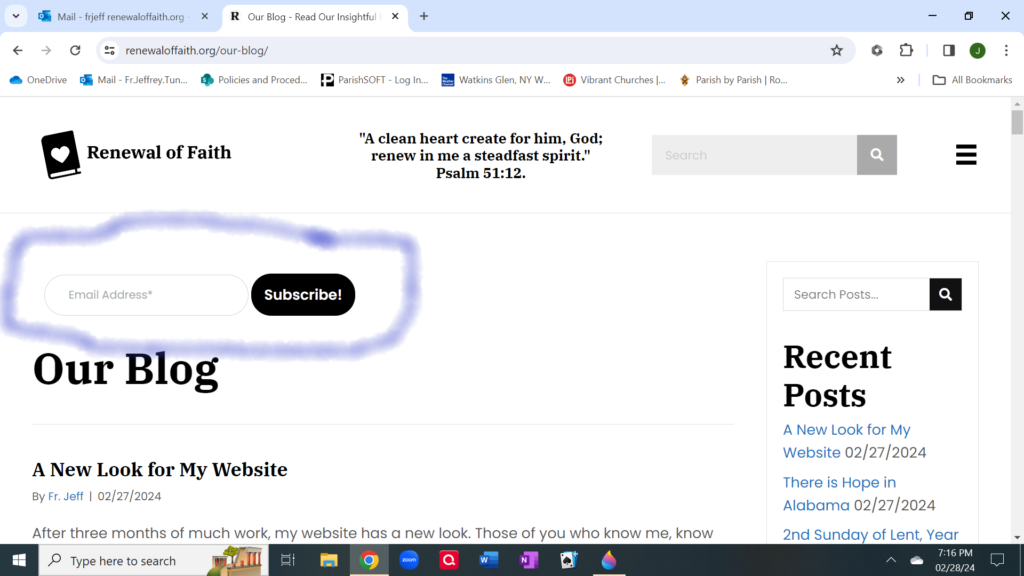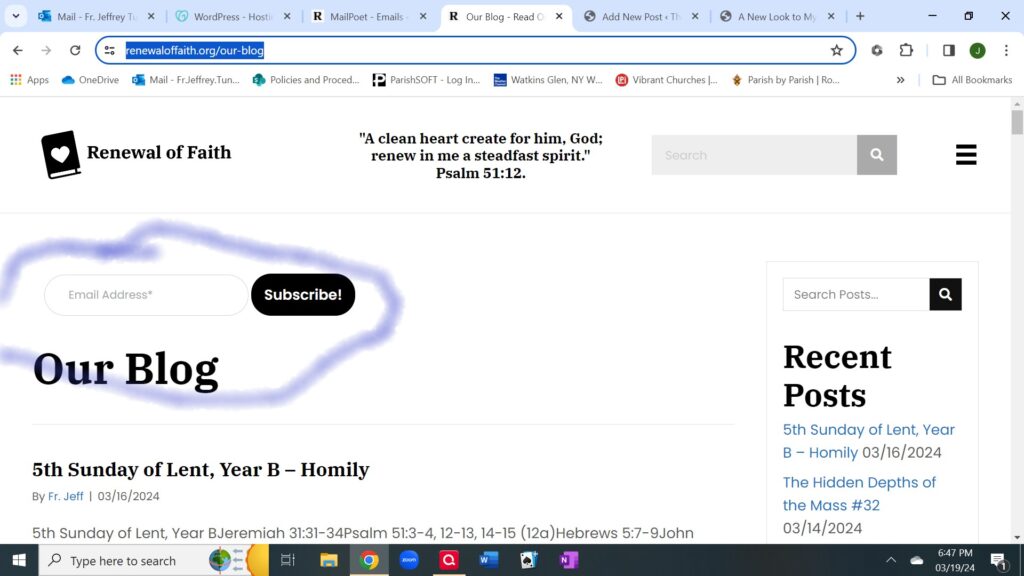As I said in my reflection on Sunday, Pilate, as the local government official, allowed Jesus to be crucified “to satisfy the crowd.” He offered to release Jesus as it was his custom to release one prisoner on this feast. The “mob” did not want Jesus released. They asked for Barabbas instead.
On Good Friday we will hear from the Passion of Jesus according to the Gospel of John. When they brought Jesus to him, Pilate asked, ‘“What charge do you bring against this man?” They answered and said to him, “If he were not a criminal, we would not have handed him over to you.”
They had no charge to offer. Why? Because Jesus had broken no Roman law. Jesus had broken no Jewish law. What had He done to lead to his arrest? The answer actually lies in what He had not done. He had not done what they expected of the Messiah. Pilate questioned Jesus. Pilate declared three times, “I find no guilt in him.” Ultimately, Pilate allowed Jesus to be crucified. Why? “To satisfy the crowd.”
I find this very saddening. We use the term “mob mentality” in such situations. Unfortunately, it continues today. I think of the riots following such tragic events as the death of George Floyd. Legitimate protests were taking over by the “mob mentality” (see my article then “How Do We Look at the World?”).
Do you allow the crowd to control you?
You probably answered no. Are you sure? Are there times when you have “gone along” with your friends, doing something you didn’t want to do?
How about what you think is right and wrong? How much do you really think for yourself? Do you make an informed decision or do you accept what people say to get along with them?
Jesus does not call us to get along with people. In fact, He knows there will be division (see Luke 12:51). Jesus calls us to truth, the truth that will set us free (see John 8:32). We need to ask ourselves where do we go for truth?
The answer should be God.
Where do you go for truth? Is it textbooks, the internet, government officials, friends, or your faith?
Relativism says there is no truth. There is. It comes from God. Unfortunately, many reject God today while others say God exists but do not grasp the truth that God offers us. Society is losing the sense of how living God’s Commandments leads us to a good life (see Deuteronomy 4:4-6).
The focus has become centered on “freedom.” Relativism says people must be free to do whatever they want. From the overemphasized focus on freedom, some people say that they are against a particular behavior but they won’t force their beliefs on others. For example, a person might say they would never have an abortion but others must make that choice for themselves.
If you feel that way, I encourage you to ask yourself why you are against abortion. I see abortion as the killing of an innocent child. Because I believe this, I know I must stand up for that innocent life. I must be a voice for that innocent child in the womb.
Whatever you are for or against, ask yourselves why you have chosen this position. Is it because you have studied the issue, including what our Catholic faith says, or is it because it is what others around you say?
This is where democracy breaks down.
Democracy is based on majority rule. However, we do not get to determine what is right and wrong. God does. Are you a friend of Caesar or a friend of God?
Just because something is common, doesn’t make it right. I remember when I was growing up, there was an expression, “if everyone jumped off a bridge, would you?” Bad behavior starts with a few people doing something and it spreading. Paul writes, “Do you not know that a little yeast leavens all the dough?” (1 Corinthians 5:6). Another expression is “one bad apple can spoil the whole bunch.”
Do we need to tolerate others (see my article “Tolerance, Hate Speech, and Dialogue”)? Yes, in the sense that we are called to love everyone. However, this does not mean we can’t speak up for our beliefs. In fact, if we love someone and see them sinning, we need to help point them to the truth. This is biblical. You can read it in Ezekiel 3:17-21. When we see someone doing something that we know is wrong, we must first ask God if He wants us to say something. Then, if we are called to say something, we need to ask God to give us the words that He wants us to say and for the courage to say those words.
Regarding freedom, I agree with Pope John Paul II when he said, “Every generation of Americans needs to know that freedom consists not in doing what we like, but in having the right to do what we ought” (“Homily of his holiness John Paul II” during his Apostolic Journey to America. Oriole Park at Camden Yards, Baltimore. October 8, 1995. https://www.vatican.va/content/john-paulii/en/homilies/1995/documents/hf_jp-ii_hom_19951008_baltimore.html. 7.). I firmly believe that what we ought to do is determined by God. Why? I do not believe this because I am afraid of God. I do it because I know God loves me (see John 3:16-17 and John 15:13) and wants what is best for me. After all, Jesus died for me.
Please pray. Please pray that God’s Truth be known by all. Please pray for those are called by God to be a voice crying out in the desert. Please pray for our church to always remain rooted in God’s Truth.
It is not for us to declare what is right and wrong. It is for us to discern what God has set as right and wrong. Jesus is the way and the truth and the life (see John 14:6). Listen to Jesus and follow him.
Peace,
Fr. Jeff


